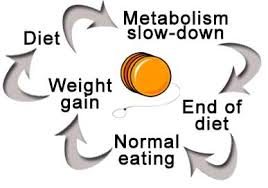
It’s interesting how the wave of fad diets has taken full grasp in our society. You hear all sorts of diets like the all eggs diet, no-carbs diet, banana diet, cabbage soup diet etc. These diets often promise an extreme and sudden weight loss that it gives off such great appeal to people and quickly becomes a trend and something of a fashion statement. Some of these diets are unhealthy, restrictive, cumbersome, cut out a whole food group, expensive and almost impossible to maintain for a Long time. People love to hear about extreme diets and so every proponent of a new diet prescribes something even more extreme than the previous one in order to elicit and invoke great interest and takers thus ensuring record breaking sales of each new diet book.
The theory of bio-individuality tells us that everyone is different. With factors like gender, blood types, metabolic rates, genetics and lifestyle to consider, every diet theory is not quite for everyone. The main idea of bio-individuality is that because we are all different, we need to all individually work out our health and weight needs. We need to be able to consider our body systems and our lifestyle in order to be fully informed in making our choices. Lifestyle includes career, schedule, level of activity, cooking habits etc.
FAD DIETS CHALLENGES
Some of the challenges I have observed in diet followers is that when you have finished a prescribed food regimen, putting on the pounds is easy and fast once you return to your normal pre-diet way of eating. This constant cycle causes a swing in body weight which could lead to body image issues, lack of self trust, lack of will power and sometimes depression. 
When we lose sight of who we are, and go on some diet without actually taking into consideration some very key factors to why we have packed on the weight in the first place, we will ultimately find ourselves back where we started or perhaps even worse off.
A few things are involved in weight gain, two of which are blood sugar level and insulin production in the body. If a diet does not teach you how to do these then you need to reconsider. Balancing your blood sugar level and thus insulin production is very important to maintaining a healthy body weight. Your blood sugar lets you know when you are hungry or not. When blood sugar levels are low the body signifies this by making you feel hungry and when sugar levels are high the body causes insulin to be released to store the excess sugar as fat. Emphasis has to be made on your eating habit becoming a lifestyle change rather than something you adhere to just for a predetermined number of days and then you’re back to where you started.
 Ogochukwu Kemdibe Ashiru is a UK certified Life and US certified Wellness coach who is passionate about helping people achieve their wellness goals using a holistic approach of keeping body, mind and spirit in sync in other to make healthy, sustainable, lifestyle choices. Connect with her on Instagram @whollyhealthsome
Ogochukwu Kemdibe Ashiru is a UK certified Life and US certified Wellness coach who is passionate about helping people achieve their wellness goals using a holistic approach of keeping body, mind and spirit in sync in other to make healthy, sustainable, lifestyle choices. Connect with her on Instagram @whollyhealthsome
